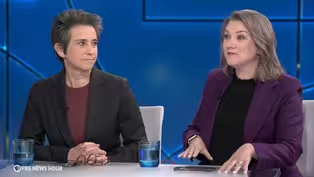
Nobel-winning economist on causes of global inequality
Clip: 10/14/2024 | 5m 34sVideo has Closed Captions
Nobel-winning economist Simon Johnson on what causes prosperity gaps between nations
The Nobel Prize in economics was awarded Monday to a trio of economists who have published research that looks at what accounts for inequality between countries and how the role of institutions, government and colonialism affected prosperity generations later. One of the winners, Simon Johnson, joined Geoff Bennett to discuss the award and some of these findings.
Problems playing video? | Closed Captioning Feedback
Problems playing video? | Closed Captioning Feedback
Major corporate funding for the PBS News Hour is provided by BDO, BNSF, Consumer Cellular, American Cruise Lines, and Raymond James. Funding for the PBS NewsHour Weekend is provided by...

Nobel-winning economist on causes of global inequality
Clip: 10/14/2024 | 5m 34sVideo has Closed Captions
The Nobel Prize in economics was awarded Monday to a trio of economists who have published research that looks at what accounts for inequality between countries and how the role of institutions, government and colonialism affected prosperity generations later. One of the winners, Simon Johnson, joined Geoff Bennett to discuss the award and some of these findings.
Problems playing video? | Closed Captioning Feedback
How to Watch PBS News Hour
PBS News Hour is available to stream on pbs.org and the free PBS App, available on iPhone, Apple TV, Android TV, Android smartphones, Amazon Fire TV, Amazon Fire Tablet, Roku, Samsung Smart TV, and Vizio.
Providing Support for PBS.org
Learn Moreabout PBS online sponsorshipGEOFF BENNETT: The Nobel Prize in economics was awarded today to a trio of economists who have published work that looks at what accounts for inequality between countries and how the role of institutions, government, and colonialism affected prosperity generations later.
The Nobel was awarded to James Robinson of the University of Chicago, Daron Acemoglu of MIT and his colleague and a frequent guest of this program Simon Johnson, also of MIT.
Simon Johnson joins us now to talk about the award and some of these findings.
Congratulations.
SIMON JOHNSON, MIT Sloan School of Management: Thank you very much.
GEOFF BENNETT: So recount the moment that you learned this morning that you were a Nobel Prize winner.
SIMON JOHNSON: Well, I woke up at 6:00, which is my usual getting up time, and just looked at my phone, again, routine, and saw there were some text messages.
And I didn't believe it, so I had to do a little bit of checking on the Internet before I finally was convinced that I had indeed won the prize with my colleagues.
GEOFF BENNETT: Yes.
And your work examines the different types of colonization and how it led to some nations being poor and others being rich.
What did you find?
What accounts for the prosperity gaps between nations?
SIMON JOHNSON: So, a big part of the prosperity gap, particularly between countries that were formerly colonized by the Europeans, is the way in which the Europeans took over those countries.
Now, in all countries, indigenous people were treated very badly.
Let's be clear about that.
But in some places, the European colonial authorities decided to bring more Europeans in, and then they wanted to make that attractive, so they'd give more rights to the people they're trying to bring in.
In other places, they didn't try to bring Europeans.
They just tried to control the local population, extract taxes, or, of course, run the slave trade and all kinds of other horrible activities.
And in those places, they set up very extractive institutions.
And the problem is, a lot of those - - these initial institutions, including the ones that are really very bad for most people, those have persisted or the effects have lasted in ways that we still live with today.
GEOFF BENNETT: What drew you to this type of research?
SIMON JOHNSON: Well, I personally came to this after 10 years of working in the former Eastern Bloc after the collapse of the Soviet empire.
I worked in Poland, other Eastern European countries, and I worked in Ukraine and Russia.
And I was frustrated with the fact that some of our standard economic tools were not really working as expected.
And I started to think about and to study corruption, the unofficial economy, and other things sort of about the structure of the economy.
And I met Daron and Jim, who were already leading lights in studying political economy, and we came up with this idea of digging deeply into what causes institutions, social, political, and economic arrangements, to be so different across countries.
GEOFF BENNETT: How do you see the role of institutions in economies across the world right now, given the rise of populism and authoritarianism across the globe?
SIMON JOHNSON: So I think there's a big challenge for institutions, a big challenge for democracy.
And part of the problem is that, over the past four decades, we have not delivered on the kind of shared prosperity that was previously promised and that was delivered on in the postwar period.
So people are disappointed, the middle class has been squeezed.
This is a definite problem in the United States, but it's in other industrial countries also.
So there's been a delegitimization of the institutions and a challenge to the way that politics has been organized, the way the economy has been organized.
And this is real.
And now artificial intelligence is arriving.
This is a major new challenge to economic opportunities for the middle class.
It's an opportunity to do things better, but it's not an opportunity that we have grasped yet.
It's -- right now, it's a serious challenge.
GEOFF BENNETT: What does that look like, harnessing technology and making it accessible to the greatest amount of people for the greatest good?
SIMON JOHNSON: Well, think about your iPhone, for example.
What is this or any mobile technology?
Is it helping people primarily with a lot of education, people who can be quite sophisticated in the use of computers?
Or is it empowering people who don't have a lot of education to acquire that education, to acquire those skills, to manage their lives better, to be more productive in all kinds of blue-collar and white-collar jobs?
That's a critical element.
If you can boost people's productivity and deliver higher wages because they have a trade union or their bargaining power is higher or just the demand for labor is very high, then you have got the basis of a genuine shared prosperity.
But if any technology that arrives, including all our digital technologies, undermine the middle class, and your - - if the focus of corporate America is replacing people with machines, with algorithms, then we have got a problem, because then you're going to be pushing even more people down out of the middle class.
GEOFF BENNETT: Winning a Nobel is such incredible validation of your work.
How might it influence your work moving forward, do you think?
SIMON JOHNSON: Well, Daron Acemoglu and I and David Autor, who's one of our colleagues at MIT, we have a research center called Shaping the Future of Work.
And I think we already have the agenda that we believe is going to carry us for some decades, which is how to get more good jobs in the United States and around the world.
It's simple to state the problem.
It's very hard to deliver.
I think it requires an all-of-society approach, certainly not just academics.
There's a lot of work for corporate people.
I work in a business school, many positive, productive, and hard conversations to be had there.
It's also, of course, a big issue for policymakers.
And I think it's something that we can confront.
We can do better.
At some episodes in the past, we have managed things so that technology delivered benefits for a broad cross-section of society.
But that's not what we have done in the past four decades.
So we need a course-correction, and that's what we're going to work on.
GEOFF BENNETT: Nobel Prize-winning economist Simon Johnson, thanks for joining us, and, again, congratulations.
SIMON JOHNSON: Thank you very much.
Colleges reach out to overlooked students from rural areas
Video has Closed Captions
Clip: 10/14/2024 | 8m 37s | How colleges are reaching out to often overlooked students from rural areas (8m 37s)
Israeli attack outside Gaza hospital kills at least 4
Video has Closed Captions
Clip: 10/14/2024 | 6m 9s | Israeli attack on tent camp outside hospital in Gaza kills at least 4, injures dozens (6m 9s)
Non-Spanish speaking Latinos reclaim culture after shaming
Video has Closed Captions
Clip: 10/14/2024 | 9m 46s | Young Latinos who don't speak Spanish are reclaiming their culture after facing shaming (9m 46s)
Tamara Keith and Amy Walter on latest campaign strategies
Video has Closed Captions
Clip: 10/14/2024 | 8m 2s | Tamara Keith and Amy Walter on campaign strategies with 3 weeks until Election Day (8m 2s)
Trump ramps up extreme rhetoric in final weeks of campaign
Video has Closed Captions
Clip: 10/14/2024 | 4m 41s | Trump ramps up his dangerous political rhetoric in final weeks of campaign (4m 41s)
U.S. providing air defense to Israel amid Iran tensions
Video has Closed Captions
Clip: 10/14/2024 | 4m 33s | U.S. providing powerful air defense system to Israel amid tensions with Iran (4m 33s)
Providing Support for PBS.org
Learn Moreabout PBS online sponsorship
- News and Public Affairs

FRONTLINE is investigative journalism that questions, explains and changes our world.

- News and Public Affairs

Amanpour and Company features conversations with leaders and decision makers.












Support for PBS provided by:
Major corporate funding for the PBS News Hour is provided by BDO, BNSF, Consumer Cellular, American Cruise Lines, and Raymond James. Funding for the PBS NewsHour Weekend is provided by...





